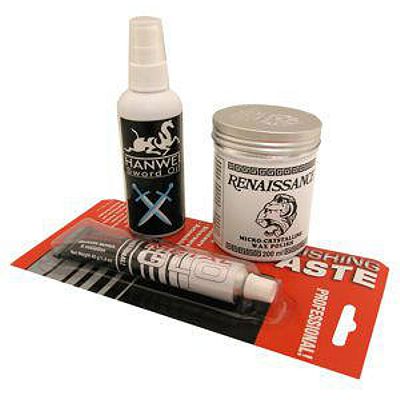How to Maintain a Functional Sword
Congratulations on Owning a Functional Sword!
Owning a sword is very exciting, especially when you have purchased a hand forged, authentic sword like the ones used hundreds or even thousands of years ago! With centuries more of metal refining advancements and generational black smiths passing this highly specialized trade down to their siblings it is very possible that the sword you posses is even stronger than the originals.
Today using all the technologies that can be applied there are a few things that can't be eliminated which every sword owner should be aware of. Functional swords can and will rust if not cared for properly. Real swords do take “battle damage” while being used. As much as we try to forge them to be indestructible, it is not possible without changing the characteristics of the sword so much that it would be unwieldy to anyone except Hercules or Thor. Climate changes and rapid temperature changes can cause parts of a sword to loosen, swell and possibly crack, split or rot.
Now I know that sounds pretty bad, but the good news is that that all those things can be avoided with some very easy care tips, proper storage and proper use. Repairing damages can be a little more complex and time consuming so it is far better to be proactive then reactive and maintain your sword. However many common damages can also be repaired if they have already occurred.
Always Protect your sword
 The best strategy is a good defense and there are two products that make it very simple that we trust and have used in our store and warehouse for almost 2 decades. When storing a blade we like to use Hanwei's sword oil to protect them. Simply apply a coat of oil on the blade and store them away in a temperature stable environment and they should stay protected for long term. The pieces we display are protected with a product called renaissance wax. This wax was developed by the British museum to protect their many priceless artifacts. We use this on any pieces that we put on display. Unlike the oil it can not be seen on the blade after being properly applied. That's it. Sounded pretty scary at first but a few minutes of care will protect your investment for the years to come.
The best strategy is a good defense and there are two products that make it very simple that we trust and have used in our store and warehouse for almost 2 decades. When storing a blade we like to use Hanwei's sword oil to protect them. Simply apply a coat of oil on the blade and store them away in a temperature stable environment and they should stay protected for long term. The pieces we display are protected with a product called renaissance wax. This wax was developed by the British museum to protect their many priceless artifacts. We use this on any pieces that we put on display. Unlike the oil it can not be seen on the blade after being properly applied. That's it. Sounded pretty scary at first but a few minutes of care will protect your investment for the years to come.
Keep your fingers off of the blade
 I know we are people but when it comes to shining things we aren't much more than birds. When a flock of your friends fly in, its even worse as your sword blade seems to turn into a giant magnet for everyone’s oily fingers and palms. It's not your friends fault, they are just attracted to shiny things and they haven't held a sword before so they don't know that their oily finger prints will act like an acid causing corrosion and potentially etching into your blade permanently if not cleaned right away.
I know we are people but when it comes to shining things we aren't much more than birds. When a flock of your friends fly in, its even worse as your sword blade seems to turn into a giant magnet for everyone’s oily fingers and palms. It's not your friends fault, they are just attracted to shiny things and they haven't held a sword before so they don't know that their oily finger prints will act like an acid causing corrosion and potentially etching into your blade permanently if not cleaned right away.
Alright, maybe it's not quite that dramatic but it is true and can damage your high carbon steels. If they are touched make sure you clean them up as soon as possible with a polishing paste and apply or re-apply which ever protection you prefer. If you had already protected your swords with the sword oil or micro-crystalline wax you sword should be alright if this has happened but once your friends have flown back home it would be a good idea to clean it up just in case.
Temperature and Humidity Levels
Changing of seasons can wreak havoc on your swords if precautions aren't taken, especially if you live in a climate like we do in London, Ontario Canada. Your swords may experience some extreme differences in temperature and humidity from season to season causing some materials to swell, shrink or possibly dry out and crack. This can lead to an array of different repairs from re-pinning, re-seating the furniture or making scabbard and saya adjustments. If possible keep your swords in a stable temperature room with a regular humidity level between 35% and 45%. Try not to display them too close to windows where the warm sunlight and drafts can have an affect on the materials. If possible try to avoid displaying your swords on exterior walls that may change temperature from day to night. It is always a good idea to apply a protective coating of renaissance wax on all parts of your sword. The wax will help seal in some moisture so that the materials don't dry out. The wax will protect all wood, leather, metal and fabric parts. If you do have to make repairs it is best to wait until the climate has stabilized. If you re-peen a pommel to tighten your blade while the handle has begun to shrink you may run a higher risk of cracking your handle once it expands to normal and has no place to expand to. If you follow these tips your swords will continue to look like new throughout the years.